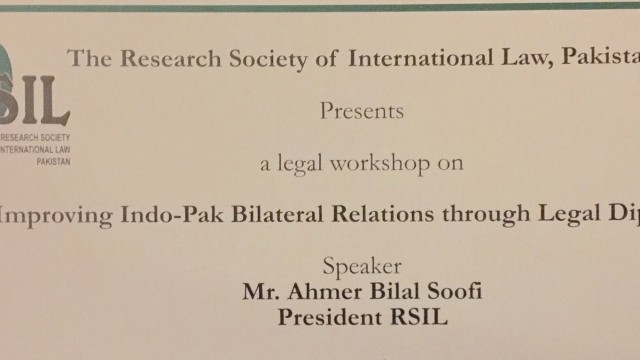Improving Pak-India Bilateral Relations Through Legal Diplomacy – Workshop By RSIL
PRESS RELEASE
Research Society of International Law Holds Workshop on Improving Pak-India Bilateral Relations through Legal Diplomacy
Pakistan’s premier legal think-tank, the Research Society of International Law (RSIL), conducted a workshop on improving Pak-India bilateral relations through the use of legal diplomacy. President RSIL, Mr. Ahmer Bilal Soofi, addressing the gathering on the occasion, gave a detailed presentation overviewing the common challenges of the subcontinent and then narrowing the scope to Pakistan and India, reflecting on issues stressing the relations between the two states, with special focus on the Mumbai trial and the recent Pathankot attack, and paving the way forward using a structured legal approach.
The event was moderated by the Foreign Secretary of Pakistan, Mr. Aizaz A. Chaudhry, with Mr. Ashter Ausaf Ali, the Attorney General of Pakistan attending as the Guest of Honour.
Mr. Soofi started off his presentation by informing the audience of the UN law on counter-terrorism (especially Security Council Resolutions 1373 and 1267), highlighting India and Pakistan’s collective and individual obligations under international law. He then proceeded to highlight the issues that, in the past and present, continue to strain the relations between the two states, giving an overview of the legal components involved.
He proceeded to address, topically, the incidents that have been harming the Pak-India relations, starting with the Mumbai incident. The President RSIL addressed the legal obligations of both the states under their respective domestic laws, highlighted the steps that Pakistan, as a responsible state, has already undertaken to address the matter and apprised the audience of the current stage of the Mumbai trial.
The recent Pathankot attack was next put under the legal microscope and the assistance required by India was addressed as well as taking a look at Pakistan’s domestic legislation, for instance the Criminal Procedure Code. A similar analysis was then applied to the case of Yadav, whereby Mr. Soofi used the term ‘Yadav Factor’ as a metaphor for state intervention. He also drew the audience’s attention towards the Samjhota Express incident in similar fashion.
Mr. Soofi then took the audience through the issue of Kashmir, highlighting not just the 18 United Nations Security Council Resolutions on the topic, but also the Simla Agreement of 1972. He referenced recent judgments of the Srinagar High Court, linking them to the current state of turmoil in the region, showing that the case for Kashmiris was indeed one of self-determination, drawing attention then to the United Nations General Assembly Resolution 2625.
The presentation used these case studies as the fundamental basis to make a strong case for legal diplomacy between the two neighbouring states, proving that unless the law – both domestic and international – and the obligations under it are understood and complied with, progress towards peaceful relations cannot be made. To substantiate on this point, Mr. Soofi put forward recommendations for each of the case studies that he had discussed earlier on, including a suggestion for the formation of a legal diplomacy centre.
Mr. Soofi concluded by reiterating his viewpoint that all the issues surrounding Pakistan and India have a strong legal underpinning and should therefore be addressed through the lens of the law. At this point in time where both the governments have a desire to improve ties despite the dip in relations, it is crucial that we show ourselves as a responsible state and effectively utilize the apparatus and tools available to us.
A moment’s silence was observed in honour of the atrocities being committed in Kashmir. Following this, the floor was opened to questions. Notable points were raised by a lawyer to the Srinagar High Court as well as honourable members of the diplomatic community and various eminent journalists. Points raised mostly revolved around the status of Kashmir and praise for highlighting the legal way forward.
The Attorney General of Pakistan also appreciated RSIL’s approach to the issue and he encouraged them to look forward to continue examining these issues. The Foreign Secretary in his concluding remarks stated that we want peaceful relations with our neighbours. He fully endorsed the approach put forward by Mr. Soofi. He also noted the various evolving multilateral regimes in terms of the growing importance of international law. Mr. Aizaz Chaudhry further remarked that Pakistan is open to sincere, sustained dialogue.
The event, held at the Serena Hotel, Islamabad, was attended by various diplomats, United Nations representatives, high level members of the military as well as members of various think tanks.


